
 Video
Video
Laparoscopic Ventral Hernia Repair using GORE® SYNECOR® BioMaterial
Carl R. Doerhoff, MD, FACS, practices in SurgiCare in Jefferson City, Missouri, presents the use of the GORE® SYNECOR® BioMaterial Laparoscopic ventral hernia repair.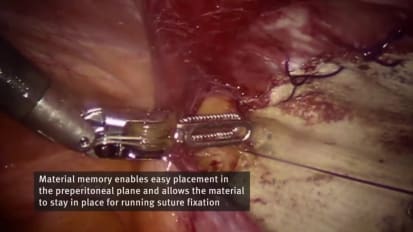 Video
Video
Robotic Preperitoneal Umbilical Hernia Repair
Robotic preperitoneal repair of an umbilical hernia utilizing GORE® SYNECOR Preperitonal Biomaterial by Matthew R. Reynolds, D.O.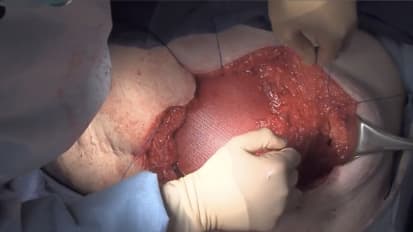 Video
Video
Ventral Hernia Repair Using the Components Separation Technique
Brent Mathews, M.D., FACS, performs a ventral hernia repair using the components separation technique. Document
Document
Biosynthetic Tissue Scaffold Recruits Progenitor Cells in Muscle Tissue Healing Model
This study demonstrates that the open, porous structure of the GORE® BIO-A® Tissue Reinforcement is able to recruit the Pax7+ cells residing in host muscle, a critical step in muscle regeneration.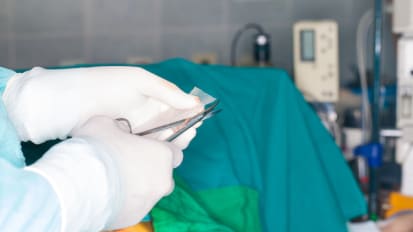 Video
Video
A Value Case Study Featuring GORE® BIO-A® Tissue Reinforcement for Hernia Repair
Learn how a US Midwestern medical center saved $340,000 with no change in quality outcomes* over 12 months when they switched to GORE® BIO-A® Tissue Reinforcement for complex hernia repairs. Learn why GORE® BIO-A® Tissue Reinforcement has proven outcomes and reduced costs for complex hernia repairs. Video
Video
Retromuscular hernia repair using GORE® ENFORM Preperitoneal Biomaterial with percutaneous suture fixation
John P. Fischer, MD, MPH, FACS, is a specialist in abdominal wall reconstruction. This is a surgical technique video demonstrating the retromuscular repair of the abdominal wall with GORE® ENFORM with preperitoneal biomaterial using percutaneous fixation.Mesh Matters: Supporting Patient Quality of Life in Robotic Complex Hernia Repair
Join us for a live virtual clinical discussion as Dr Amit Gogia, M.D., FACS, reviews emerging trends in complex robotic hernia repair and abdominal wall reconstruction, including a review of mesh materials, and how these may have an impact on patient outcomes.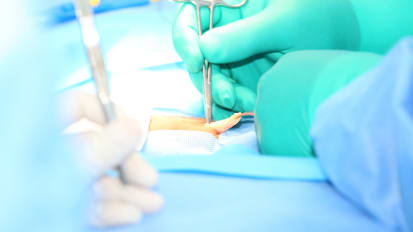 Document
Document
Learn More About GORE® SYNECOR Biomaterials
Hybrid hernia repair device for high BMIs, multiple comorbidities and recurrent defects are now available. Document
Document
Retro-rectus Placement of Bio-absorbable Mesh Improves Patient Outcomes
Our primary objective was to determine the longterm surgical outcomes of retro-rectus and intraperiteonal placement of mesh. Document
Document
A Cost Comparison of Mesh Usage in Laparoscopic Paraesophageal Hernia Repair
The aim of this study was to compare costs of the GORE® BIO-A® Device, ALLERGAN ALLODERM Device, and ALLERGAN STRATTICE Device in relation to the outcomes in terms of length of stay and recurrence rate following PEH repair.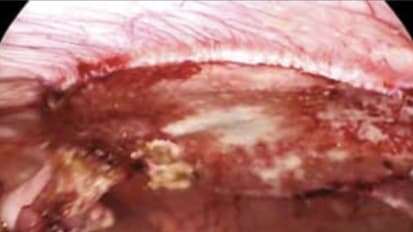 Document
Document
Mesh Selection for Hernia Repair: Expert Review of Biologic, Synthetic and Bioabsorbable Types
Today, mesh closure is the standard in hernia repair, a credit to advances in materials and surgical techniques since usher.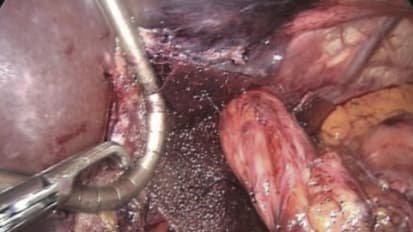 Document
Document
Tissue Reinforcement with GORE® BIO-A® Material in Large Hiatal Hernias: A Prospective Clinical Study
GORE® BIO-A® Tissue Reinforcement is a three dimensional resorbable mesh which has demonstrated to be a ideal “scaffold” facilitating tissue generation and healing without the risk of a non-resorbable implant.